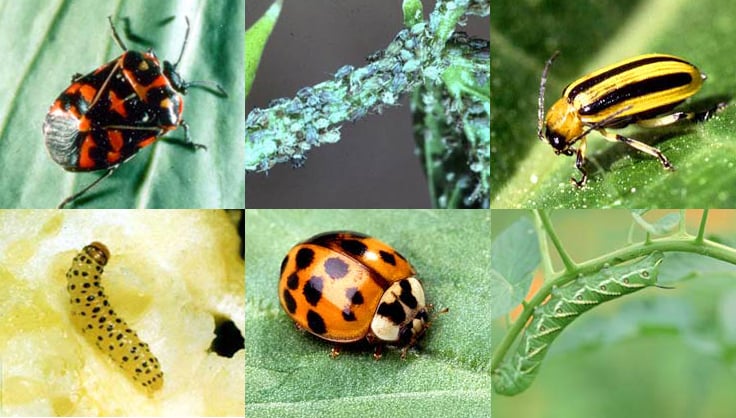
How do you deal with common garden pests?
Gardening is a rewarding hobby that beautifies our outdoor spaces. Every gardener faces challenges, and one of the most common is dealing with garden pests. Invaders can cause havoc on your plants, damaging leaves, stems, and fruit.
Aphids – the tiny troublemakers
Aphids are small, soft-bodied insects in various colours, including green, black, and pink. These pests cluster on new growth and the undersides of leaves, sucking sap from plants and causing distorted growth. To control aphids:
- Spray plants with a strong water jet to dislodge them
- Apply insecticidal soap or neem oil to severe infestations
Slugs and snails – slimy destroyers
These molluscs leave telltale slime trails and can quickly devour young plants and seedlings. To protect your garden from slugs and snails:
- Use beer traps to lure and drown them
- Create barriers with copper tape or diatomaceous earth
- Encourage natural predators such as birds and hedgehogs
Spider mites – microscopic menaces
These tiny arachnids are barely visible to the naked eye but can cause significant damage by sucking plant juices, leading to stippled leaves and webbing. To combat spider mites:
- Increase humidity around plants by misting regularly
- Use insecticidal soap or horticultural oils
- Prune and destroy heavily infested plant parts
Japanese beetles – destructive defoliators
These metallic green beetles feed on many plants’ leaves, flowers, and fruits, leaving behind skeletonized foliage. To manage Japanese beetles:
- Hand-pick beetles and drop them into soapy water
- Use pheromone traps to lure and capture them
- Apply neem oil or pyrethrin-based insecticides
Scale insects – armoured invaders
Scale insects attach themselves to plant stems and leaves, sucking sap and weakening the plant. To manage scale insects:
- Prune and destroy heavily infested plant parts
- Use horticultural oils to suffocate the insects
- Apply systemic insecticides for severe infestations
Thrips – tiny but troublesome
Thrips are slender insects that rasp plant tissue and suck out the contents, causing silvery patches on leaves and distorted growth. To control thrips:
- Use blue sticky traps to monitor and catch adults
- Introduce predatory mites or minute pirate bugs
- Apply insecticidal soap or neem oil to affected plants
Earwigs – nocturnal nuisances
While earwigs can benefit from eating other insects, they can also damage soft plant tissues and fruits. To manage earwig populations:
- Set up traps using rolled newspaper or cardboard tubes
- Create barriers using petroleum jelly or diatomaceous earth
- Encourage natural predators like birds and toads
Integrated pest management for long-term success
While dealing with specific pests is important, implementing an integrated pest management (IPM) approach can help prevent and manage pest problems in the long run. IPM combines various strategies to create a holistic pest control approach:
- Prevention – Choose pest-resistant plant varieties and maintain healthy soil to promote vigorous plant growth.
- Monitoring – Regularly inspect your plants for signs of pest activity and identify problems early.
- Cultural controls – Implement proper watering, pruning, and sanitation practices to make the environment less pest-friendly.
- Mechanical controls – Use physical barriers, traps, and hand-picking to manage pest populations.
- Biological controls – Encourage beneficial insects and other natural predators in your garden.
- Chemical controls – Use pesticides as a last resort, opting for less toxic options when possible.
By implementing these strategies and staying vigilant, you can effectively manage common garden pests and maintain a beautiful, thriving garden. Always consider the environmental impact of your pest control methods and strive for a balanced approach that promotes overall garden health. When facing persistent pest problems or seeking expert advice on plant care, consider consulting with professionals at aradhyanursery.com.



